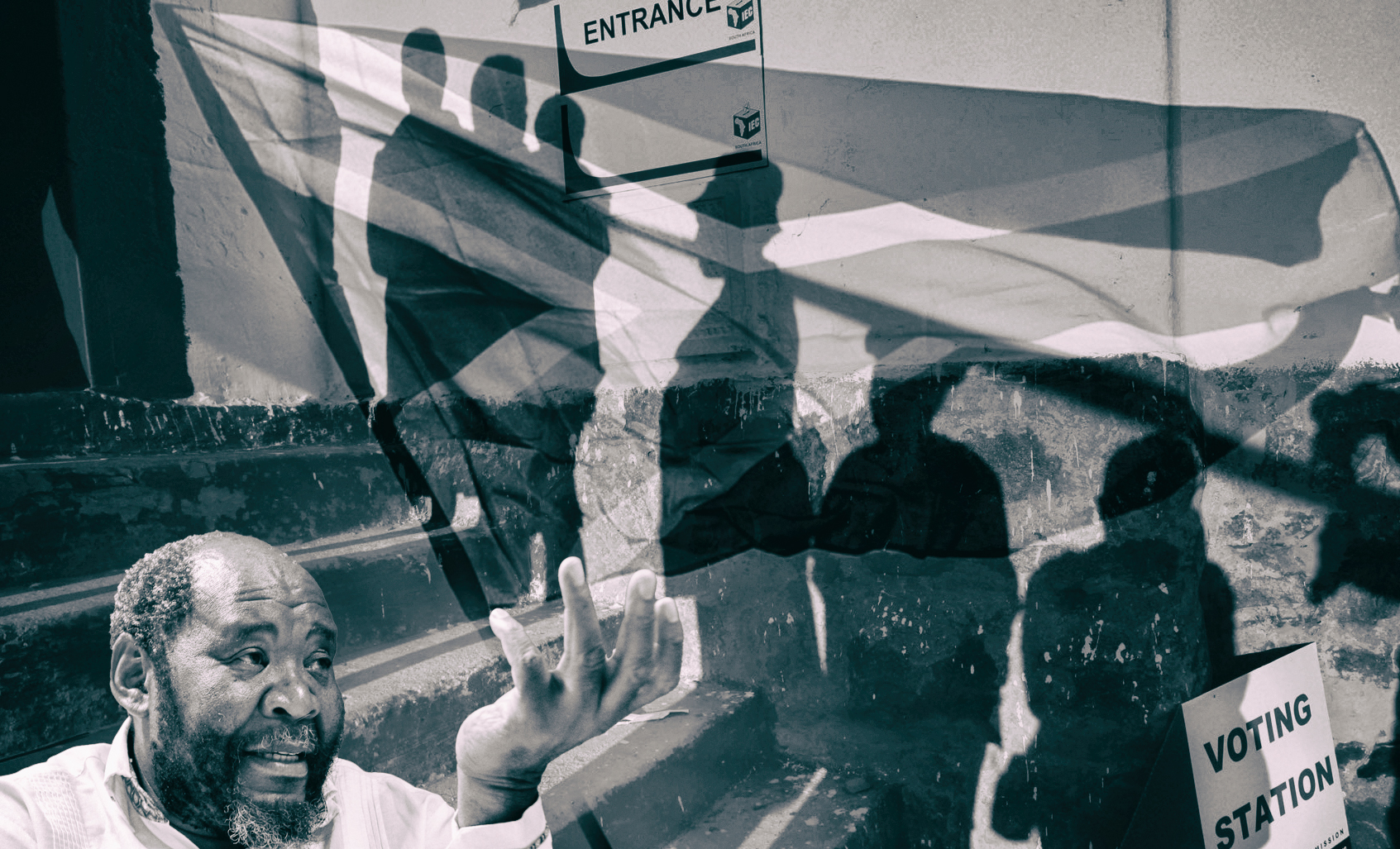Read Part One of our interview series here.
Despite BBEE and other economic transformation and education policies since the dawn of democracy, black and coloured South Africans have witnessed declining progression in skilled employment and higher education outcomes.
On the other hand, whites and Indians have benefited economically and educationally from the post-apartheid-era dispensation, as evidenced by their sustained progression on these fronts.
This is according to Dr Pali Lehohla, the former Statistics South Africa chief and academic.
See the Census 2022 report data here.
The census data – computed from the 2001 and 2011 censuses and 2016 Community Survey – “display a dismal and a declining progression for black and coloured citizens at [the] higher education level completion rate”, he said.
“In the Seventies and Eighties, for every one black person (as a proportion of their population group) who would complete a B-degree, there were 1.2 white persons who would complete the same. The corresponding numbers for 2016 derived from the Stats SA Community Survey show that for every one black person completing a B-degree there are six white persons who were doing the same.
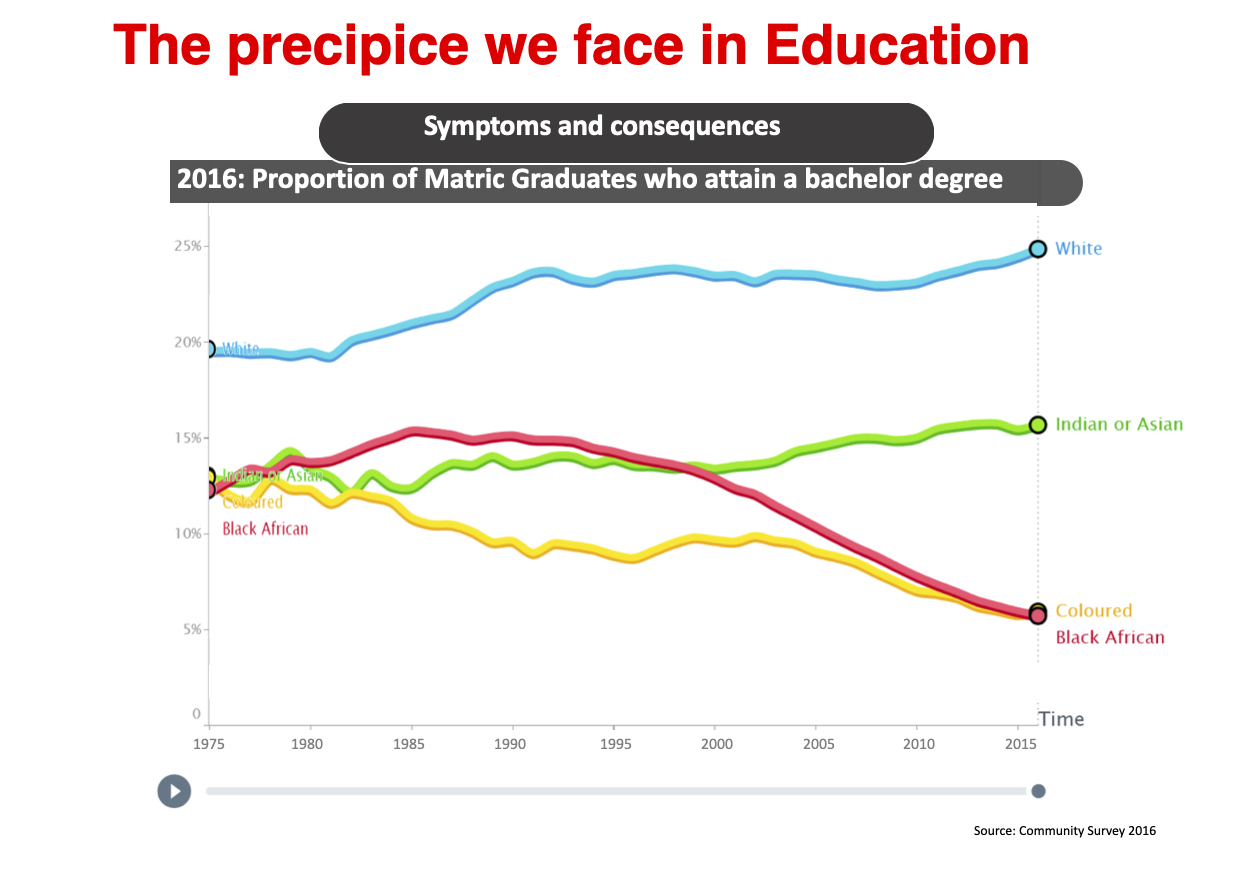
However, while these figures painted a “quite depressing” picture of completion rates over the past 50 years, they were not unsurprising. In fact they should be expected, Lehohla added, pointing out that South Africans rank water, employment and electricity as priorities one, two and three respectively – and education at 15.
“This is very sad because education is central to nation-building and is an important instrument for transformational development,” he said.
Lehohla believes poverty and lack of funds are among the main factors impeding black progression in higher education.
“Fees Must Fall was aimed at fighting this. But instead, government has decided to extend NSFAS funding to only those they perceive to be poor, which is not a solution because it still leaves out many black students whose parents, on paper, may seem to afford to pay for fees but in reality they come from single-parent families and often their mothers have to look for the absent father to plead with him to pay.
“I think the government can solve this problem by paying for all students – rich and poor, black, white, Indians and coloureds – so that they can all have equal and unfettered access to higher education and they can qualify quicker, start their careers and start paying taxes. It is also in higher education that students from all race groups can start talking about the South Africa they want to build for their future.”
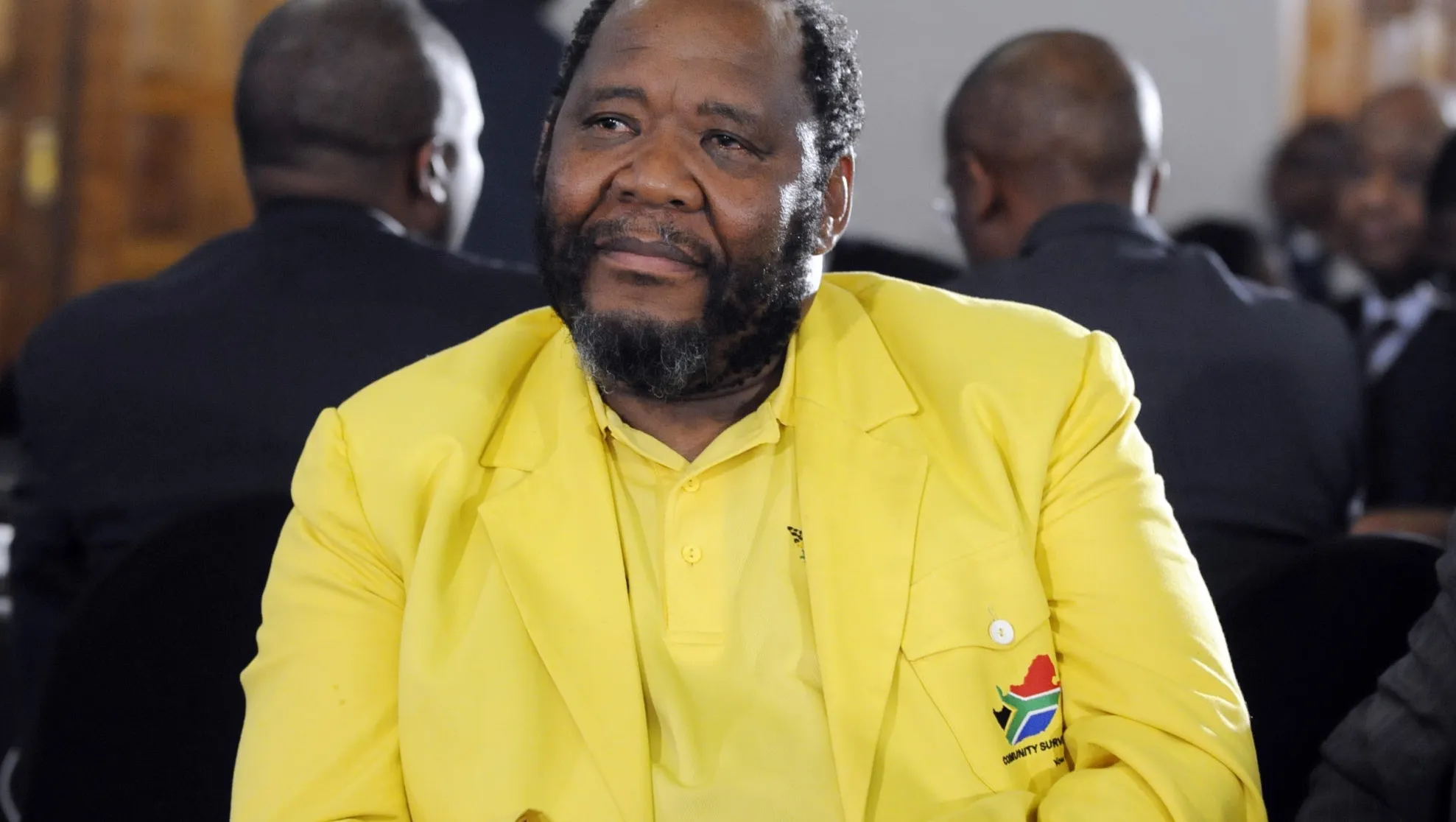 The then statistician-general, Pali Lehohla, at the Gauteng Economic Indaba in Johannesburg on 8 June 2016. (Photo: Gallo Images / Sowetan / Peter Mogaki)
The then statistician-general, Pali Lehohla, at the Gauteng Economic Indaba in Johannesburg on 8 June 2016. (Photo: Gallo Images / Sowetan / Peter Mogaki)
In the workplace
The proportion of whites in the workforce rose from 42% in 1994 to 65% in 2023, according to the Stats SA Quarterly Labour Force Survey.
“For blacks, especially those aged between 25 and 34, the figures have regressed from a share of 17% of the skilled workforce to 14% over the same period. This means that the black youth in this age group have regressed. More generally, blacks are sadly stuck at 15% of the skilled workforce on average. They have never moved in 30 years,” Lehohla said.
He added that Census 2022 confirmed the trends that began in the early years of the post-apartheid dispensation in higher education: Whites sustained their apartheid advantage, with Indians gaining the most in post-apartheid South Africa. Blacks and coloureds progressed at a snail’s pace. They are well below 11% over 28 years, while their Indian counterparts are at 20% and whites at 44%.
The survey, issued in September 2020, revealed “substantial shifts towards skilled work among white and Indian/Asian populations, with the proportion of skilled workers increasing from 42% in 1994 to 61% in 2020 among the white workforce and an increase among the Indian/Asian workforce of 25% to 51% over the same period”.
According to these statistics only 15% of blacks on average and 20% of coloureds make it into the skilled workforce.
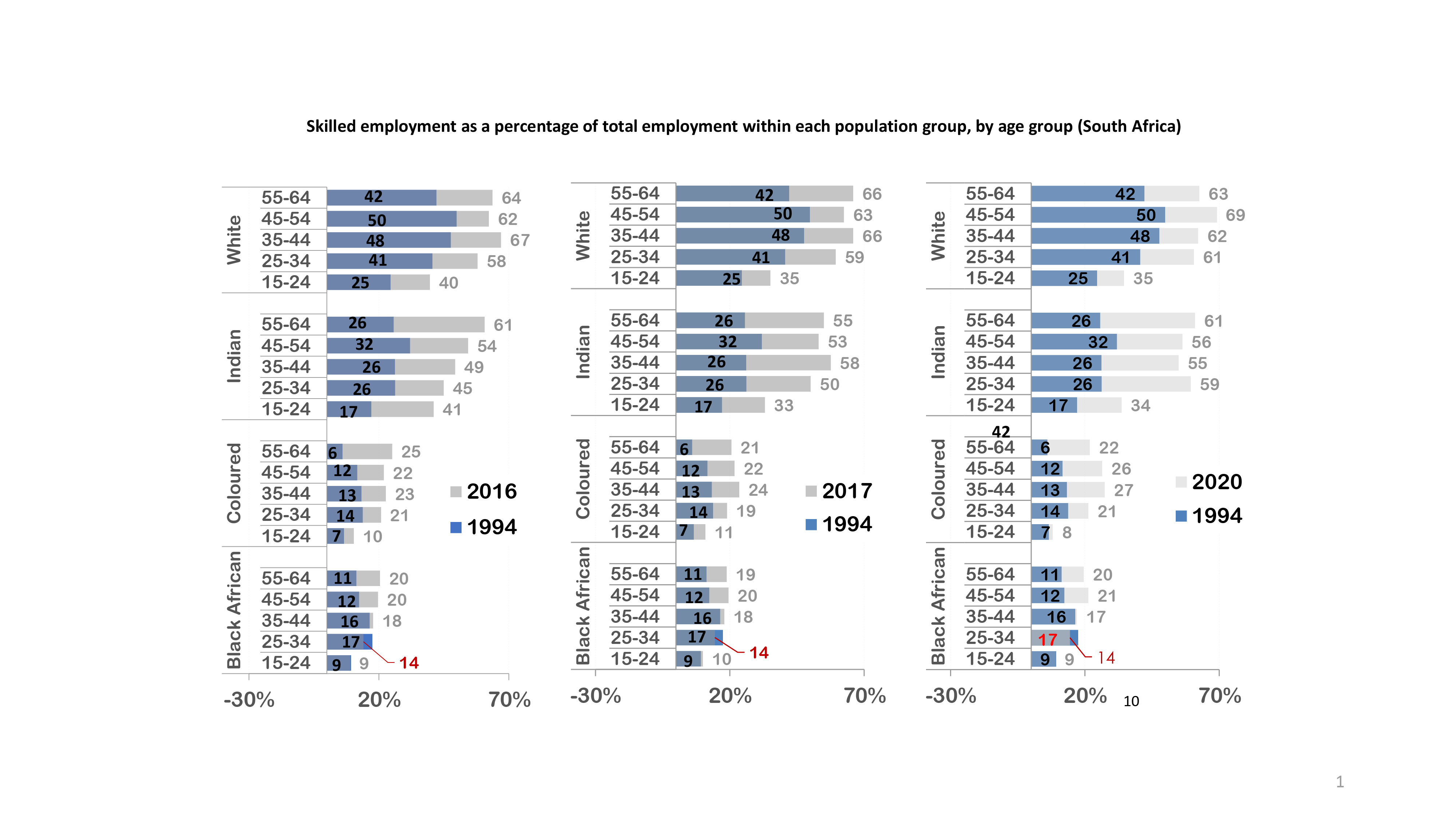
Lehohla concludes from these figures that “the new dispensation has delivered for the elite, but has failed the black majority and coloureds as groups. Whites and Indian South Africans have progressed significantly during this period.”
Solving black poverty
Lehohla said South Africans from all races and social strata need to ask themselves critical questions rather than rely on politicians to solve their problems.
He cited a 2021 Human Sciences Research Council report which revealed that the unemployment rate among black South Africans was 39%.
“This was at least nine percentage points higher than that of coloured South Africans and 30 percentage points higher than that of white people.
“In fact, both proportionately and in absolute numbers, those aged 15 to 34 have lost their share. One million and six hundred thousand [fewer young people] are employed 15 years later compared with 2008. Sadly this happens against a growing population. This implies that declining living conditions among the youth are accelerating. This (illustrated in the graph below) shows this untenable situation based on the Quarterly Labour Force Survey time series data between 2008 and quarter 3 of 2023.
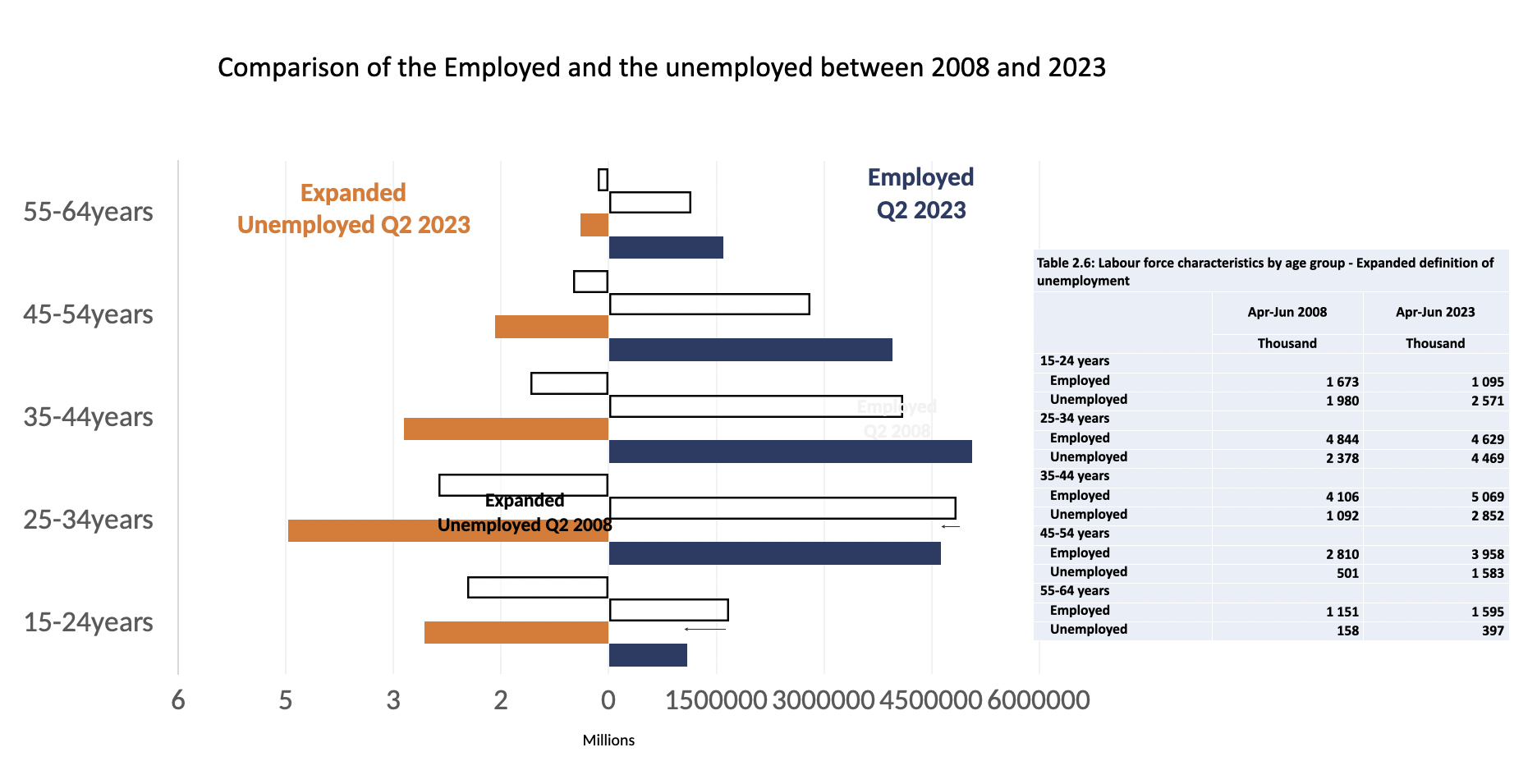
“In the South African context, we have to ask: When will blacks and coloureds achieve as high a proportion of 65% as skilled workforce like their white counterparts and what tools [will] we need to use to achieve it and over what period of time?”
An election not pinned to these facts “can only condemn blacks and coloureds to the 15% and 20% skill level that was fossilised in 2000”.
A skilled and professional civil service
Lehohla believes South Africa can never achieve the kind of growth needed to uplift the poor, the majority of whom are black, unless it designs macroeconomic and social policies that are fit for purpose, and addresses its private- and public-sector corruption conundrum.
“We need to build a strong and ethical civil service sector. We need to build a civil service that is not loyal to individuals, but loyal to the nation and the Constitution. We need a civil service made up of technocrats and people with foresight. We also need an independent Public Service Commission to monitor the effectiveness and performance of the public service.
Teachers and the police cannot fix goods that were damaged at birth and whose systems of livelihoods were fossilised at 2000 levels of skill.
“When we have the civil servants such as the likes of Hendrik van der Bijl, the scientist and founding technocrat of Eskom in 1922, and others of his ilk, whose foresight and creation still serve society today, then we can understand what Madiba and his legacy mean to us.”
A broken society and me-me politics
Against the backdrop of a racialised society that continues to be defined by past injustices – compounded by entrenched greed and incompetence of politicians and government officials, impeding any meaningful transformation of society – Lehohla had a stark warning:
“A broken society can be very dangerous and self-defeating. Providing elections as an antidote to their disease is a dangerous drug which will suffer an all-round abuse of society by the frenzy me-me addiction.”
He maintained that successive censuses and surveys have revealed “fossilised” patterns where the vast majority of children have no fathers, which often results in heightened societal dysfunction and gender-based violence and other violent crimes. It also led to high school dropout rates, resulting in a rise in generational anger and exposure to criminality.
“We need to fix parenting in our society. Teachers and the police cannot fix goods that were damaged at birth and whose systems of livelihoods were fossilised at 2000 levels of skill.
Successive governments have failed to address the deepening indigenisation of poverty, inequality and unemployment.
“The graph below shows the schisms of parenting, where only 32% of fathers’ names appear on children’s birth certificates. In 68% the name of the father does not appear. In fact 66% of mothers to these children say they are not legally married, compared with 60% of fathers who claim to be married. Only 31% of mothers confirm a marital status against 60% of fathers claiming this. Fathers have long been discarded from family life that they schizophrenically lay claim to. Unfortunately this dysfunctional parenting is passed onto teachers and the police force to solve. It cannot and it will not work in a million years.”
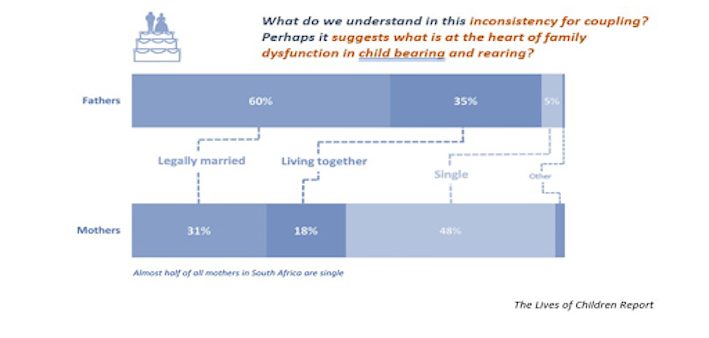 Marital status of mothers and fathers.
Marital status of mothers and fathers.
Solving the economic impasse
Lehohla believes a dialogue should also focus on South Africa’s economic challenges and potential, on “who gains and who loses in our economy and why should that be the case and what compensatory mechanisms can be put in place”.
“For that to happen, you need massive economic modelling capability in the state and capacity among its operatives. For instance, developed nations use their pension funds to address their societal challenges and developmental agendas and missions. South Africa has R17-trillion in private sector-held pension funds and R3-trillion in public sector pension funds (mainly in Public Investment Corporation)... There are also some billions of unclaimed pension funds, the latter due to the policies of apartheid. We can use all this money as a force for good in the region.
“But the laws constrain the macroeconomic value of these instruments and resources. We also have governance issues, nobody would want to invest such massive funds to a government that is littered with corruption. But at the same time, it is inconceivable for the same corrupt hands to borrow from other lenders internationally. That process is equivalent to money laundering, because the same pensions would have to be used to settle state debt when the government defaults on paying international lenders.
“It is very sad that South Africa has all these resources and also has a vast mineral wealth, yet its economy is stagnant and 55% of its population live below the poverty line. So, the elephant in the room is least about elections, but all to do with this unresolved material benefits that a democracy has to dispense through sound economic and social policies.
“We may have to share lessons with Bolivia which faced similar problems like South Africa. But Bolivia chose to merge economic and social policies to answer poverty and inequality. They have made meaningful progress under Evo Morales since 2005 and currently under President Luis Arce, a politician, economist, banker and academic who worked under Morales and ascended to power in 2020. They are successfully addressing the question of the indigenous population. In South Africa the evidence is clear. Successive governments have failed to address the deepening indigenisation of poverty, inequality and unemployment.”
Lessons from Kigali
In 1994, as South Africa was transitioning from apartheid, a great calamity was unfolding in the Great Lakes region.
A plane carrying the then Rwandan president, Juvénal Habyarimana, was shot down, sparking an anti-Tutsi minority propaganda campaign that led to genocide, with 800,000 Tutsis and moderate Hutus butchered. The genocide only came to an end when the Tutsi-led Rwandan Patriotic Front (RPF) toppled the government and began a process of national reconciliation.
Paul Kagame, who became president a few years later, has been accused of carrying out targeted hits on dissidents.
But Kagame is also credited with bringing about policies that have cleaned up the civil service and led to unprecedented economic and social progress. As a result, he has worn the tag of a modern-day benevolent dictator.
Lehohla said that while he does not want to be seen as praising despots and political demagogues, there are valuable lessons that South Africa can learn from post-genocide Rwanda and some of the impact of Kagame and his government.
We cannot move one step without cleaning our pigsty and hope the pigsty politics of our current edifice will change.
As the chair of the Africa Symposium on Statistical Development, Lehohla has visited Rwanda several times, notably in 2007, during the second symposium, where Kagame made a commitment to evidence-based policymaking.
“The results, 16 years later, continue to reflect that commitment. Their development is anchored on the principle of ‘Cleanliness is Godliness’ and the rest followed. For example, just look at the progress that Rwanda – our twin – has made in technology, on women empowerment, on youth development and its stature in world affairs. They are the host of the United Nations Datalab for official statistics, representing Africa. They have the highest number of female ministers on the African continent. Kigali is a sought-after capital because of its cleanliness and orderliness. The Rwandan GDP over the decade ending in 2019 grew at an average of 7.2%, something (that) South Africa can only dream of in three decades of democracy,” he said.
Some good lessons could be learnt or emulated from Rwanda’s post-war reconstruction and from Bolivia, “but these require frank conversations, agreements and commitments before an election can take place”.
“Kagame could have rushed for power in 1994. But instead he bided his time and was very tactful when he took over a few years later. Rwandans were only armed with brooms when the RPF came into power in 1994. They used these brooms to clean up scattered corpses, the streets, the villages, the environment and, after four or so years, they cleansed Rwanda of pig conduct using these brooms.
“We, in South Africa, have been moving in the opposite direction. We have vast resources and skills at our disposal but we are on the road to being a failed state, a banana republic. We cannot move one step without cleaning our pigsty and hope the pigsty politics of our current edifice will change. We need to learn from our twin Rwanda [about preparing for] how to use and dispense power.
“Politicians and political parties in South Africa have so far displayed high affinity for a vulture culture, wherein they fight over a dead carcass instead of showing a commitment to raising Lazarus from the dead, which is a monumental national task, well beyond the comprehension and capacity of political parties. It is a sacred national effort.
“That is why I argue that politics must pause, and society should reset on a national agenda to confront this cancer. Only then can society receive applications from jockeys that society can scrutinise for their competence to root out this deep-seated cancer of our nation. Unleashing this current mad rush into an election is not going to deliver judicious distribution of services across space and time to the nation.” DM
Who is Pali Lehohla?
- Pali Jobo Lehohla held the position of Statistician-General of South Africa from 2000 to 2017.
- He has served as co-chair of PARIS21 and chair of the United Nations Statistics Commission.
- He was the founding chair of the Statistics Commission of Africa and chaired the Africa Symposium on Statistical Development.
- He was vice-president of the International Statistics Institute and sponsor of the Young African Statisticians movement.
- He served on the 25-member Data Revolution panel appointed by the UN secretary-general, and was appointed to the Independent Accountability Panel for the health of women, children and adolescents.
- In 2015, he was recognised by his alma mater, the University of Ghana, for his contribution to the development of statistics and awarded an honorary doctorate by the University of Stellenbosch in the same year. (Source: United Nations)




